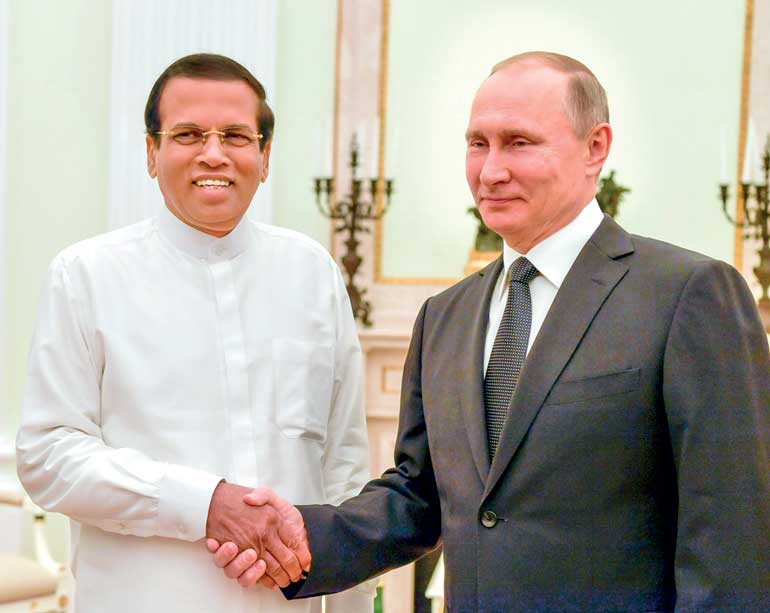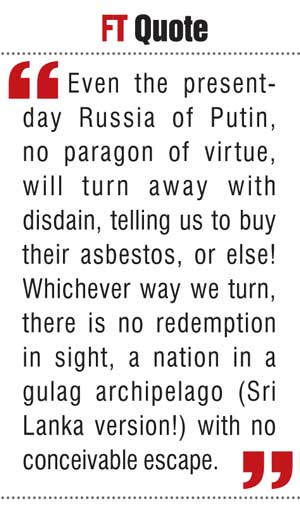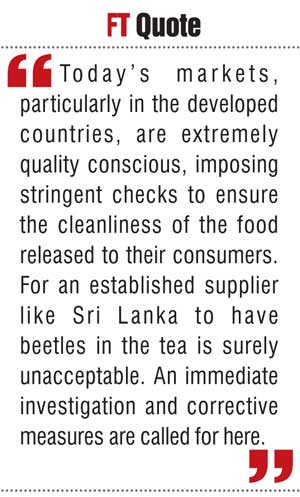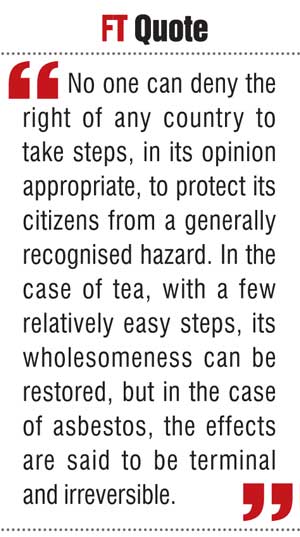Saturday Feb 07, 2026
Saturday Feb 07, 2026
Thursday, 28 December 2017 00:00 - - {{hitsCtrl.values.hits}}

If proof was ever needed, the asbestos for tea trade-off with Russia has shown us the humbleness of our situation in the most humiliating manner.
Tea was introduced to this country by the British, not because they perceived it as the mainstay of an export-oriented economy of an independent Ceylon (as we were known then). For the policymakers of imperial Whitehall it was imperative that their far-flung colonies should not be a charge on the British Exchequer; instead, they should be self-supporting and if possible, an economic asset to the Crown. Our economy at the time was based primarily on subsistence agriculture, save for the trading in cinnamon and other spices along the coastal belt. For colonies with large acreages of unutilised land, plantations were a natural development, a method successfully tried out already in the Caribbean and other colonies, mainly with sugarcane.
The credit for the development of commercial scale plantations and the concomitant infrastructure go to the British, the consummate empire builders, turning the island of spicy fragrance into ‘Lipton’s Tea Garden’; newly introduced plants; tea, coffee, and rubber becoming dominant. The escalating demands of the plantations not only brought about deep going socio-economic changes, including educational facilities, but also resulted in the large scale import of Indian labour to an economically weak country with an abundant human resource availability. Sure, there were reasons for importing labour to a country which already had adequate labour, but they were the reasons of an imperial power looking at its immediate interest, and not that of the indigenous people.
Post-independence model
After independence, we continued with the model, content by and large with the economy that the three commodities; tea, rubber and coconut provided. Evolving scenarios periodically compelled us to consider other activities like tourism, garments and the export of labour to the Middle-East; but the fundamental dependency on the three commodities, continues. In terms of foreign exchange earnings, employment provided and livelihood dependency, their importance even today is crucial.
While other countries moved from commodity production to significant value adding; from manufacturing to providing of services; we continued in a comfort zone, large scale transformations more talked about than  implemented. The limitations of the national psyche, both in ideas and imagination, are such that even the social habits of the Planter Raj were copied by their brown-skinned successors; only now in the place of the Queen, they toast the minister in charge. In spirit and attitude, the mimics are obviously not the pioneering types, braving strange cultures and climes. But it is only a parody, in everything else, the quality has dropped; it is said that many of today’s planters demand ‘commissions’ and kickbacks from the various suppliers to the estate. Like in all other business activities now, what the estate buys, depends on the consideration paid to the planter; a corruption that runs through the process, right up to the delivery of the tea to the foreign buyer. In such a tainted system it really should be no surprise that the end user – the tea drinker – discovers bugs floating in his morning tea!
implemented. The limitations of the national psyche, both in ideas and imagination, are such that even the social habits of the Planter Raj were copied by their brown-skinned successors; only now in the place of the Queen, they toast the minister in charge. In spirit and attitude, the mimics are obviously not the pioneering types, braving strange cultures and climes. But it is only a parody, in everything else, the quality has dropped; it is said that many of today’s planters demand ‘commissions’ and kickbacks from the various suppliers to the estate. Like in all other business activities now, what the estate buys, depends on the consideration paid to the planter; a corruption that runs through the process, right up to the delivery of the tea to the foreign buyer. In such a tainted system it really should be no surprise that the end user – the tea drinker – discovers bugs floating in his morning tea!
In the early days, most of our tea went to England and other European countries. Now our biggest buyers are from the Middle-East and Eastern Europe, including Russia. Whoever we sell it to; it is not acceptable to have insects in the tea. Today’s markets, particularly in the developed countries, are extremely quality conscious, imposing stringent checks to ensure the cleanliness of the food released to their consumers. For an established supplier like Sri Lanka to have beetles in the tea is surely unacceptable. An immediate investigation and corrective measures are called for here.
Banning asbestos
Asbestos or the ban thereof by Sri Lanka, on the other hand, is a story of a relatively weak nation endeavouring to protect its citizens from the ill-effects of a product widely considered injurious and even responsible for terminal diseases. Not being experts in the field, we cannot speak for the validity of the complex arguments brought out by the manufactures to allay our fears on this matter. Apparently Russia is a major manufacturer of asbestos in the world. However, no one can deny the right of any country to take steps, in its opinion appropriate, to protect its citizens from a generally recognised hazard. In the case of tea, with a few relatively easy steps, its wholesomeness can be restored, but in the case of asbestos, the effects are said to be terminal and irreversible.
This is perhaps what is meant by the German word ‘Realpolitik’, politics which are coercive, amoral: ‘you buy our asbestos or we will not buy your tea!’A weak and poor nation anxious to sell its tea, has no option but succumb, it seems.
A state of weakness
Seventy years of our own governments have brought us to a state of pathetic weakness. It is not only in tea that we are vulnerable. Recently, a rabid dog attacked a young tourist from a European country. The victim died a few days later. Fearing cancellations of hotel bookings, the entire tourist industry braced for a crisis. Because of the plentiful availability of cheap labour, we were one of the early countries in the South Asian region to get into large scale garment manufacturing (in the mid 1970s). Today, many new entrants to garments have bypassed us. In order to find an export market, we canvassed strenuously to have restored concessionary entry terms to the European market, a concession reserved for the least developed countries in the world. When an Arab country suggests a change of policy with regard to its foreign labour, thousands of Sri Lankan families shudder with fear for the loss of a livelihood.
We export in order to earn precious foreign currency. This hard-earned foreign currency is well used. Get on to any Sri Lankan road and you will see some of the most modern and expensive vehicles in the world on them; very many of these swanky vehicles are owned by either the Government or public companies; in other words, paid for, with other people’s money. If it is a politician travelling, it will not be just one but a convoy of powerful vehicles whizzing past. In recent times our  governments have invested in harbours with no ships, airports with no planes and huge theatres without any performers. In far-away places in the country there are whole cities built for sports and cinema, fields where we have shown only moderate proficiency, waiting for Godot! We also have a national airline that would serve the nation better if it stops flying. Inept actions of our politicians have only diminished vital institutions. Our banking system, overrun with cronyism, conflict of interest situations and influence peddling, has no real credibility.
governments have invested in harbours with no ships, airports with no planes and huge theatres without any performers. In far-away places in the country there are whole cities built for sports and cinema, fields where we have shown only moderate proficiency, waiting for Godot! We also have a national airline that would serve the nation better if it stops flying. Inept actions of our politicians have only diminished vital institutions. Our banking system, overrun with cronyism, conflict of interest situations and influence peddling, has no real credibility.
Russia is the land of towering figures like Lenin, Tolstoy and Solzhenitsyn; men who needed no lessons on social justice. It was said of Lenin that he kept accounts for the working class of the unholy doings of the undesirables. Although much water has flown down the Volga since the heady days of the revolution, Russia has remained a friend to our poor and backward country. Even a pauper can have dignity but when a nation’s business methods are questionable and its leadership perceived to be in the grip of scoundrels, that nation has no credit in international eyes. So even the present-day Russia of Putin, no paragon of virtue, will turn away with disdain, telling us to buy their asbestos, or else!
Whichever way we turn, there is no redemption in sight, a nation in a gulag archipelago (Sri Lanka version!) with no conceivable escape.
That is how far down we have fallen.